| Srl | Item |
| 1 |
ID:
127971
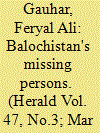

|
|
|
| 2 |
ID:
147651
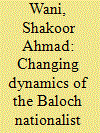

|
|
|
|
|
| Summary/Abstract |
In recent years the Baloch national movement has undergone a sea change. The dismantling of rudimentary representative institutions by the military regime of Pakistan’s president, General Pervez Musharraf, set off a process of radicalization of Baloch nationalism. The excessive reliance on a coercive state apparatus has not only alienated the moderate nationalists but also increased the popularity of a separatist creed. This article argues that aggressive resource exploitation and state repression is pushing Balochs toward secession.
|
|
|
|
|
|
|
|
|
|
|
|
|
|
|
|
| 3 |
ID:
106036


|
|
|
|
|
| Publication |
2011.
|
| Summary/Abstract |
The fate of missing persons is a central issue in post-conflict societies facing truth recovery and human rights dilemmas. Despite widespread public sympathy towards relatives, societies emerging from conflict often defer the recovery of missing for decades. More paradoxically, in post-1974 Cyprus, the official authorities delayed unilateral exhumations of victims buried within cemeteries in their own jurisdiction. Analysis of official post-1974 discourses reveals a Greek-Cypriot consensus to emphasise the issue as one of Turkish aggression, thus downplaying in-group responsibilities and the legacy of intra-communal violence. We compare the experience of Cyprus with other post-conflict societies such as Spain, Northern Ireland, and Mozambique and explore the linkages between institutions and beliefs about transitional justice. We argue that elite consensus initiates and facilitates the transition to democracy but often leads to the institutionalisation of groups opposing truth recovery even for in-group members.
|
|
|
|
|
|
|
|
|
|
|
|
|
|
|
|
| 4 |
ID:
112413
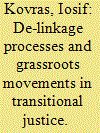

|
|
|
|
|
| Publication |
2012.
|
| Summary/Abstract |
Transitional justice literature has highlighted a negative relationship between enforced disappearances and reconciliation in post-conflict settings. Little attention has been paid to how human rights issues can become stepping-stones to reconciliation. The article explains the transformation of the Cypriot Committee on Missing Persons (CMP) from an inoperative body into a successful humanitarian forum, paving the way for the pro-rapprochement bi-communal grassroots mobilization of the relatives of the missing. By juxtaposing the experience of Cyprus with other societies confronting similar problems, the article shows how the issue of the missing can become a driving force for reconciliation. The findings indicate that a policy delinking humanitarian exhumations from the prospect of a wider political settlement facilitates positive transformation in protracted human rights problems and opens up a window of opportunity to grassroots actors.
|
|
|
|
|
|
|
|
|
|
|
|
|
|
|
|
| 5 |
ID:
113067
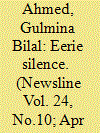

|
|
|
| 6 |
ID:
155162
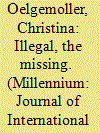

|
|
|
|
|
| Summary/Abstract |
Migration Management, a regime of radical differentiation and exclusion, renders many people illegal because they violate the laws of access across geopolitical borders. Migration Management further disappears some of these illegal people outside of the external boundaries of the Global North. Recently, however, discursive moves to mobilise the concept of the ‘missing person’ in the context of illegal migration have been introduced when discussing Mediterranean migration in particular. This article offers an ethico-political evaluation of such conceptual innovations. The article asks if a reconceptualisation of the illegal migrant as ‘missing person’ is able to destabilise Migration Management and concludes that this is unlikely. The article illustrates how this reconceptualisation cements the more radical practices of exclusion whilst the boundary-drawing is reformulated as one between dead and living migrants.
|
|
|
|
|
|
|
|
|
|
|
|
|
|
|
|